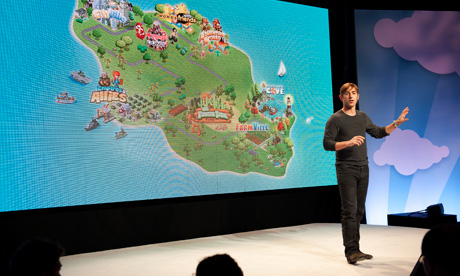
Zynga may have made its first fortune on Facebook, but mobile is where it sees its lucrative future. The social games publisher's newly mobile-first focus was clear in its latest financial earnings call.
Zynga reported revenues of $311m for the fourth quarter of 2012, and a net loss of $48.6m. Revenues were flat year-on-year, but bookings – the amount actually spent within the company's games – were down 15%. This, in a nutshell, shows why Zynga needs strong mobile growth in 2013.
"In the third quarter, we realigned our company to a mobile-first focus," chief executive Mark Pincus told analysts in Zynga's earnings call following the results announcement. "We ended the year with more of our new game teams focused on mobile than web."
Chief operating officer David Ko expanded on that, telling analysts that whereas two years ago Zynga had around 20 people focused on mobile gaming, now "most of the company is focused on the mobile opportunity as more and more of our players are coming to us from mobile".
That's true enough. in Q4 2012, Zynga had 298m monthly active users (MAUs) for its games, including 72m mobile MAUs. Meanwhile, it had 56m daily active users (DAUs) and 20m mobile DAUs.
72m mobile MAUs is up 75% year-on-year, with mobile also making more of a contribution to Zynga's bottom line – 21% of its bookings in Q4 2012 compared to 8% a year before.
With the other 79% of Q4 2012 bookings being Facebook-related, mobile is starting to offer Zynga the alternative revenue stream it has been craving for some time – to reduce its dependency on the social network.
Zynga executives were certainly bullish about the publisher's position in the mobile/social games market, with Pincus claiming that Zynga's US mobile players "spent more time in our game than the next five game companies combined" in December 2012.
Ko pointed to data from comScore indicating that Zynga had the fifth-largest daily audience in mobile in the US, behind giants like Google and Facebook. "We likewise rank fifth in overall time spent on mobile, with 10.7 billion minutes in December 2012," he said during the call.
While that's impressive, it's clear that a relatively small number of games are shouldering much of Zynga's mobile growth. For example, Pincus said that Words With Friends generated 7.5bn minutes of playtime in December 2012 alone – this is global, rather than US alone.
Words With Friends' daily active users jumped 13% year-on-year in Q4 according to Ko, although other games fared less well. Zynga's 72m mobile MAUs may have been up healthily year-on-year, but it was down from 79m in Q3 2012. Pincus said that was " largely due to declines in Draw Something", the drawing game Zynga bought for $200m in March 2012.
Draw Something's decline has shown that even Zynga doesn't have a midas touch on mobile, although one bright spot in Q4 was the launch of card-battling mobile game Ayakashi, which Ko said has already become "our highest-monetising mobile game on a per-user basis".
That points to a big plank in Zynga's mobile strategy for 2013: deeper "midcore" games sitting in between its FarmVille-style casual heritage and hardcore console-style games.
"Midcore represents our biggest opportunity to reach new audiences and drive growth across web and mobile," said Pincus, who added that Zynga's new-game pipeline is "heavily weighted" towards midcore titles in 2013. "We're planning to launch several more midcore and invest-and-express titles on mobile in 2013," noted Ko.
Invest-and-express? That's the phrase Zynga likes to use for games like FarmVille and CityVille. FarmVille 2 has been a big hit on Facebook, and Pincus confirmed that it will be ported to mobile devices in 2013.
Interestingly, mobile isn't quite as much at the forefront of Zynga's plans to move into real-money gambling. The company has partnered with gambling firm bwin.party to launch its first web real-money games in the first half of 2013 in the UK: Zynga Plus Casino and Zynga Plus Poker.
"We'll be rolling out these products in multiple phases across a range of platforms in the U.K., namely via web, download, Facebook, and if we choose, mobile," said Ko. That "if we choose" contrasted sharply with the "mobile-first vision espoused throughout the rest of the call.
What Zynga really wants to do in 2013, though, is bring its social gaming network to mobile devices, rather than just individual social games. Pincus suggested in the call that it's still too hard for mobile gamers to find people to play against, despite the availability of Facebook's open graph and (on iOS) Apple's Game Center.
"We're amazed that the number-one way our Words With Friends players find new opponents in their game is through the 'random' button. We know we can offer them something more compelling than that," said Pincus.
"What they really want is an instant community, so on mobile, we're creating a network that will make it easier for people to play together. Similar to what we've achieved on the web, this network will offer a powerful distribution channel, so when we and our third-party partners build the best games, they'll be guaranteed the biggest audiences."
This isn't a new ambition for Pincus. In fact, when I interviewed him in 2009 at a very early stage for Zynga's mobile ambitions, he was complaining that Apple hadn't "turned on the plumbing required to make it a great social gaming platform", and brainstorming what the company should do to mirror Facebook's platform.
Game Center still isn't that, so Zynga's "instant community" plans will be intriguing to watch in 2013.

